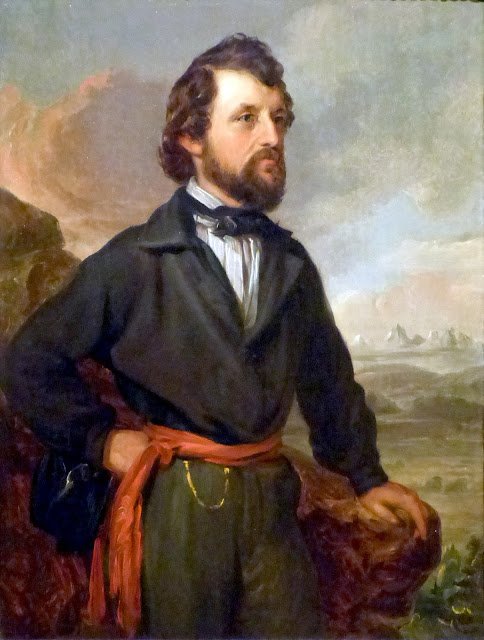By Larry Clinton, Sausalito Historical Society
This portrait of John C. Frémont by William Smith Jewett hangs in the National Portrait Gallery in Washington, DC.
John Charles Frémont, the man who named the Golden Gate and became a senator from the new state of California in 1851, was a contrary and controversial figure throughout his life. An opponent of slavery, he nevertheless massacred indigenous peoples on numerous occasions while leading expeditions in the western states. We previously reported that during the Bear Flag revolt of 1846, he directed his scout, Kit Carson, to kill three Californios who innocently approached his camp in Marin because "I have got no room for prisoners.”
Thanks to the power of his father-in-law, Senator Thomas Hart Benton of Missouri, chairman of the Senate Committee on Military Affairs, Frémont enjoyed suportive connections and privilege. As an army major, he took control of California from the California Republic and was eventually court-martialed and convicted of mutiny and insubordination after a conflict over who was the rightful military governor of the territory. But his sentence was commuted, and he was reinstated by President James K. Polk.
While Frémont made his early reputation as an explorer, contemporaries often questioned the accuracy of his reports. In 1885, the Daily Alta Californian, in a long essay on California history, noted that “Before the acquisition of California by the United States it was a land as little known to the common world, in all the world besides, as Patagonia or Cochin China. There had been imitators of Marco Polo, who had actually visited the coast and, like him, had strangely exaggerated the scenes they witnessed. Others, after the manner of Munchausen and Gulliver and Jules Verne, had liberally drawn upon their own fanciful imaginations to coin into facts the creations of their own vagaries.”
The newspaper noted that Senator Benton had been informed about California by the official reports and private letters from his son-in-law, “who had twice made the journey overland to and from California, and had borne part in the war for its possession. That Major Emory [surveyor William Hemsley Emory] was the actual author of the official report which Colonel Frémont had published as his own is a matter of fact. It was prepared from the most reliable data that could be obtained at the time. It bore, in some instances, the dictation of Frémont himself, who was as headstrong in his fancies as General [Stonewall] Jackson was resolute in his convictions, and hence, while it was an admirable description of the topography and apparent characteristics of the country, with a fair statement of its climate and its general features, as to its qualities of soil and agricultural resources, the report might as well have been given of the unexplored regions of New Holland [mainland Australia].
“According to Colonel Frémont's idea of California, it was not destined to become a great producing State. He noticed — it would be curious to learn how— that the honey bee neither existed nor could exist westward of the Rocky Mountains; and he stated this of the land which is now so celebrated for the deliciousness of its honey product as famed Hybla of Sicily was in the ages when the gods chose it for their feasts. The Mission Fathers and the early Californians of Spanish blood had succeeded in raising every product of the earth — cereal, fruit and berry, for which they cared; but that they were, nevertheless, not fully informed of the fertility of the soil is true, for the sufficient reason that they never were required to test it — that it was never necessary for them to do so.”
Frémont was able to shrug off criticisms like that and went on to become the first Republican nominee for president of the U.S. and founder of the California Republican Party when he was nominated. He lost the election to Democrat James Buchanan.
In his later years, according to Wikipedia, Frémont “was appointed governor of the Arizona Territory by President Rutherford B. Hayes and served from 1878 to 1881. He spent little time in Arizona, and was asked to resume his duties in person or resign; Frémont chose resignation. Destitute, the family depended on the publication earnings of his wife Jessie.”
Frémont lived in New York in retirement. In April 1890, he was reappointed as a major general and then added to the Army's retired list, enabling him to qualify for a pension. He died of peritonitis in 1890, at the age of 77.

